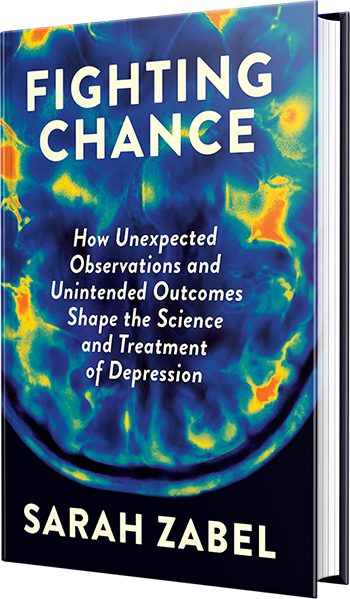
he voice on the other end of the phone was familiar but shaky. It was Sarah’s friend Carolyn, and she was grappling with suicidal ideation.
“Something had her in its grip and would not let go,” Sarah Zabel explains. “I kept wondering, what’s doing this? How does a normal, happy person come to feel life is so bad that she must kill herself?”
A decade after that first phone call, solutions for Carolyn’s major depressive disorder remained elusive, and Sarah felt compelled to understand why.
Fighting Chance: How Unexpected Observations and Unintended Outcomes Shape the Science and Treatment of Depression delivers a 360-degree look inside the world of this debilitating illness, featuring interviews with more than 20 experts in the fields of neuroscience and psychiatry, current research and the unforgettable stories of 16 people personally impacted by depression.
Described by Sarah as a “science book for non-scientists,” Fighting Chance tackles key questions that have guided scientific research for decades and delves into the discoveries that have formed the medical world’s understanding of the disorder. Peppered throughout are more than 20 illustrations that help explain the science involved — making it widely accessible.
Sarah adeptly explores topics ranging from the neurobiology of depression to antidepressant medications; stress and inflammation; genetics; suicide; traditional and alternative therapies and treatments; and even gives a nod to Big Data’s efforts to clarify depression’s causes and cures.
Ultimately, Fighting Chance is a tale of human endeavor and ingenuity, of downright weird experiments and serendipitous discoveries, and of people who valiantly battle for answers for themselves and for people they will never know.
Author Sarah Zabel graduated from the U.S. Air Force Academy with a degree in computer science in 1987 and was commissioned a second lieutenant. She retired from the Air Force in 2018 as a major general and decided to turn her focus to her life-long love of learning and become a science writer. She set herself the task of first coming to understand, and then to explain for other lay-persons, the science behind some of life’s most complex but important human experiences. Inspired, intrigued and frustrated by an enduring friend’s battle with depression, she set that topic as her first task. Sarah does occasional consulting and other activities associated with her time as one of the military’s leaders in cyberspace operations and security, in the provision of communications and other services to a community, and leadership of a diverse workforce.
For more information, please visit her website.

Leave a Reply